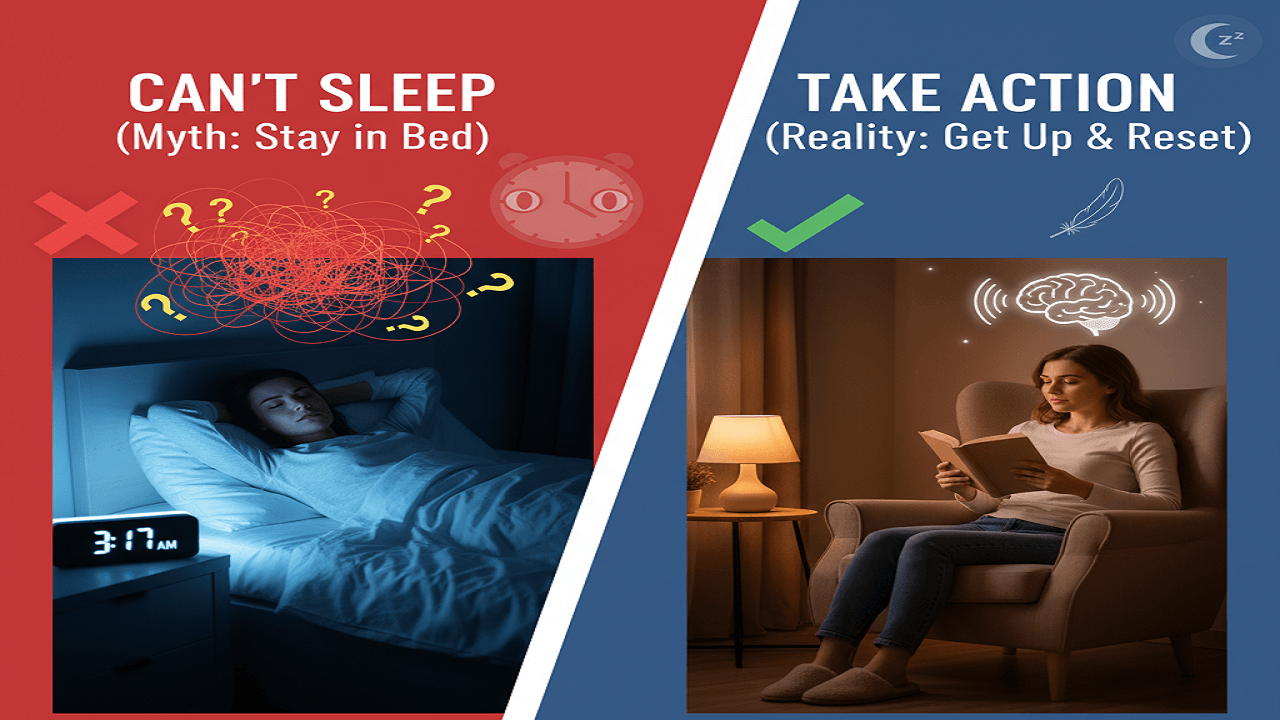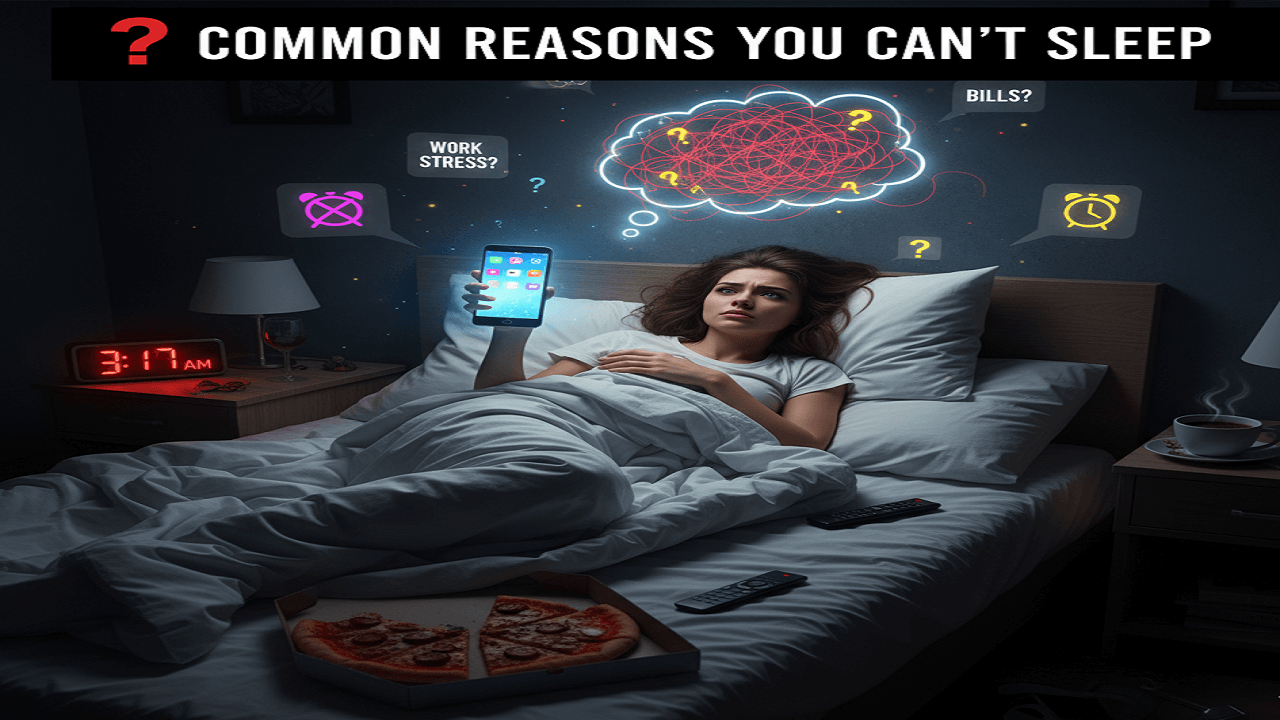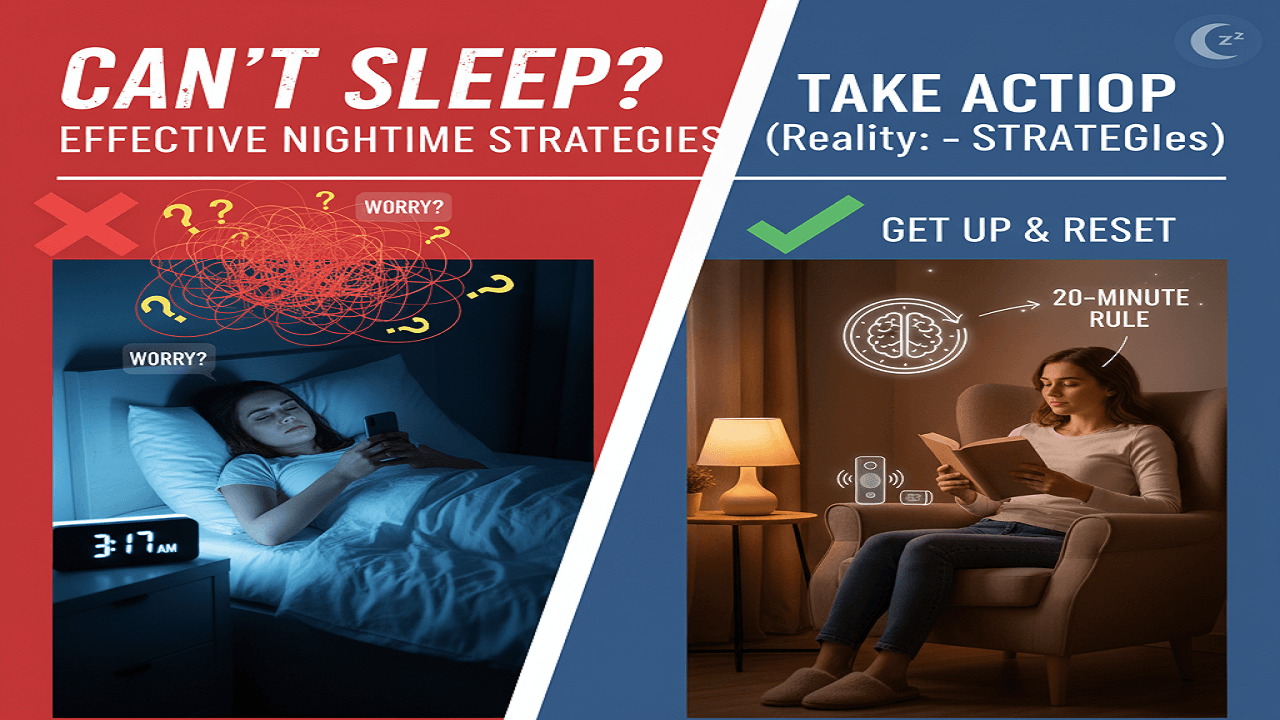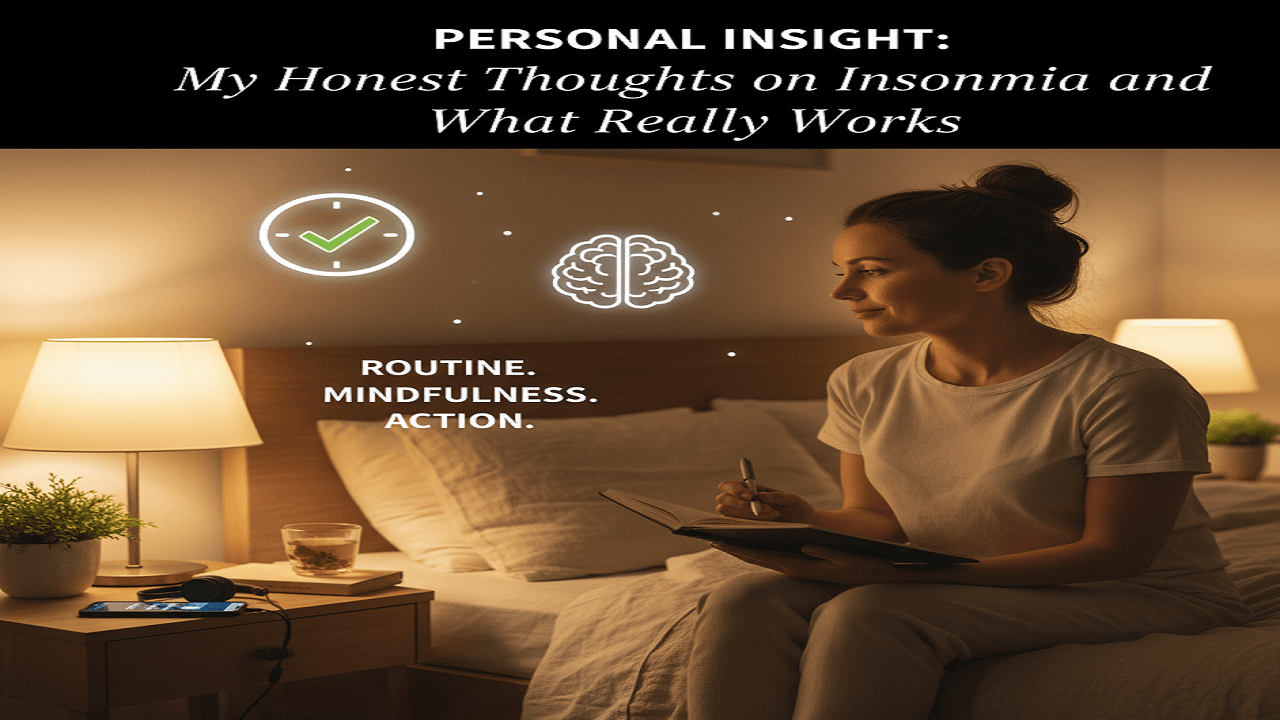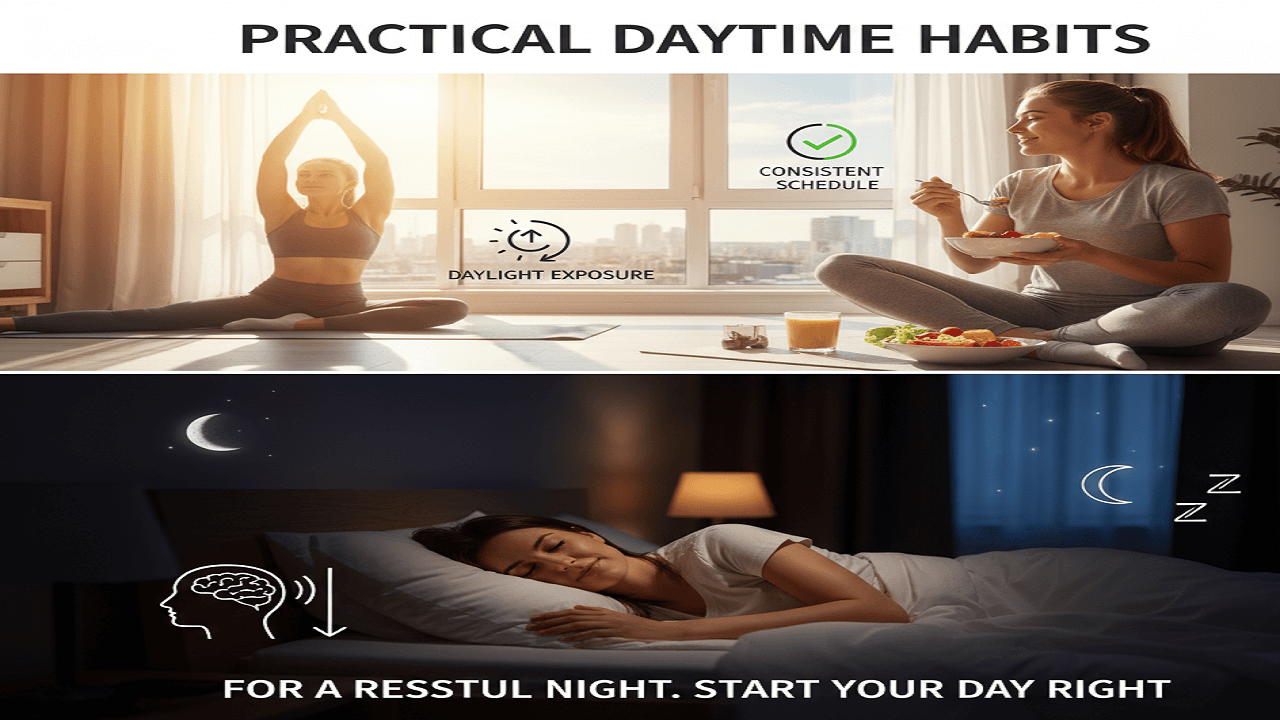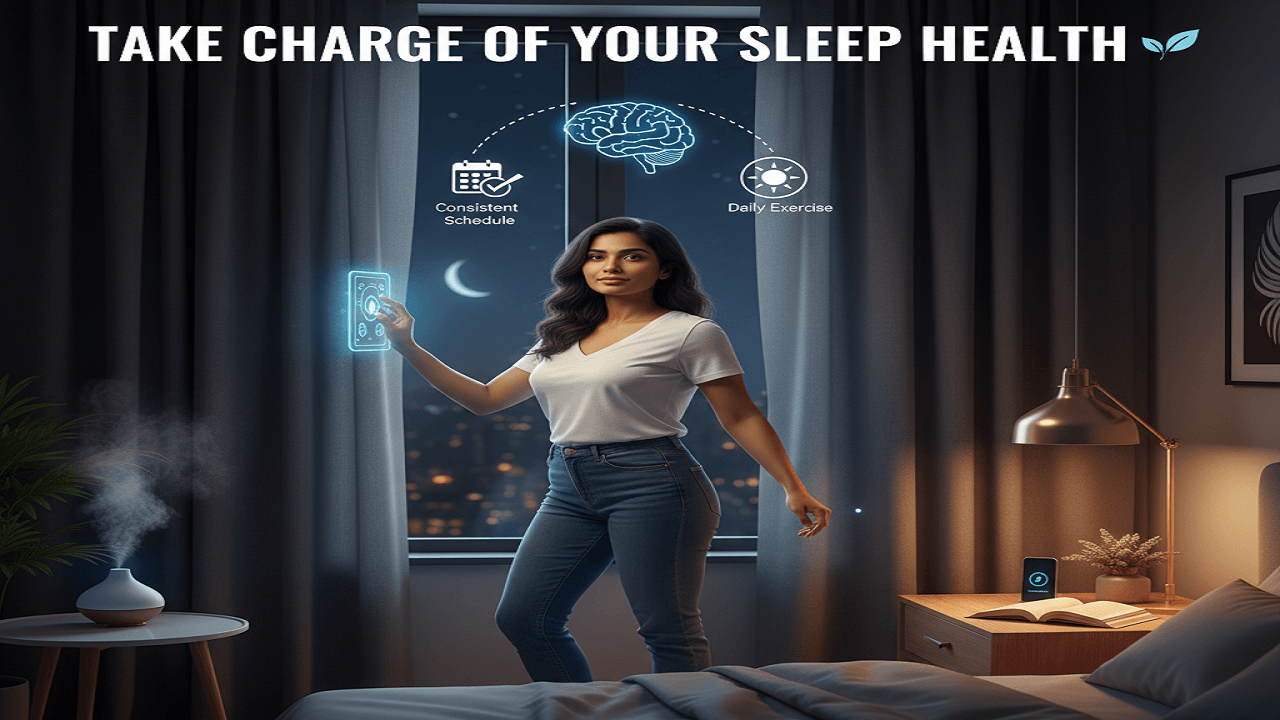If you’ve ever lain in bed for hours and can’t sleep, you know how frustrating it can be. Tossing and turning at night not only steals your rest but also affects your overall health and daily performance. Many people search for what to do if they can’t sleep because they want quick, effective solutions to calm their minds and fall asleep faster.
Sleep is vital for your body’s recovery, hormone regulation, and mental clarity. When you consistently struggle with insomnia or find it hard to fall asleep fast, it can lead to fatigue, irritability, poor focus, and even long-term health issues like heart disease or depression. Whether it’s due to racing thoughts, stress, or an uncomfortable mattress, identifying the cause is the first step toward better sleep.
This guide will walk you through expert-backed insomnia tips, practical nighttime adjustments, and proven methods for how to fall asleep when you can’t. You’ll also find personal insights to help you approach sleep problems more effectively — because sometimes, the best advice comes from real experience, not just science.
Table of contents
Common Reasons You Can’t Sleep
Before figuring out what to do when you can’t sleep, it’s essential to understand why your body and mind resist rest. Sleep problems often arise from several key factors — including mental health, physical health, and nutrition. Knowing these root causes can help you discover how to fall asleep faster and wake up feeling refreshed.
1. Mental Health Factors
Your mental state has a direct impact on your ability to fall asleep and stay asleep. Stress, anxiety, and racing thoughts often top the list of reasons why people lie awake at night. Conditions like depression, PTSD, ADHD, and chronic stress can keep your brain in overdrive, making it nearly impossible to relax.
If you’re constantly overthinking, journaling before bed, meditating, or talking to a licensed therapist can help calm your mind. A mental health professional — such as a psychologist or psychiatrist — can guide you toward healthy coping mechanisms and, if needed, prescribe treatments that improve your sleep quality. Prioritising your emotional well-being is often the first step toward conquering insomnia.
2. Physical Health Influences
Your body’s condition also determines how easily you drift off. If you’re experiencing pain, hormonal changes, or chronic fatigue, these could be silently affecting your sleep cycle. For example:
- Age: Sleep patterns change as we age, often becoming lighter or more fragmented.
- Hormones: During puberty, pregnancy, or menopause, fluctuating hormone levels can disrupt sleep.
- Pain: Chronic conditions like arthritis or back pain can make it difficult to get comfortable enough to sleep.
- Medication: Some prescriptions can interfere with your body’s natural circadian rhythm, leading to insomnia or restless nights.
If these issues sound familiar, consult your doctor. Adjusting medications, treating underlying pain, or improving sleep posture can significantly boost your sleep quality.
3. Nutritional Habits
What you eat — and when you eat — can deeply affect how you sleep. Diets high in sugar, caffeine, or processed foods can overstimulate your body and make it difficult to relax. Instead, focus on balanced meals rich in whole grains, lean proteins, and magnesium-filled foods like bananas or almonds.
Try not to eat within three hours of bedtime to give your body time to digest. Avoid alcohol and caffeine late in the evening, as they can delay sleep and reduce its quality. Remember: your body can only rest well when it’s properly nourished and balanced.
Transition to Next Section:
Now that you understand the most common causes of sleeplessness, let’s explore what to do if you can’t sleep — practical, science-backed strategies to help you fall asleep fast and wake up refreshed.
What to Do if You Can’t Sleep — Effective Nighttime Strategies
When you’ve been lying in bed for hours and can’t sleep, it’s easy to feel helpless. But the truth is, many simple techniques can help your body relax and your mind unwind. If you’re searching for how to fall asleep when you can’t, these strategies can make a real difference tonight.
1. Create a Relaxing Environment
Your surroundings play a big role in how easily you fall asleep. A dark, cool, and quiet room signals your body that it’s time to rest. Dimming the lights and using soft music or calming sounds can help lower your stress hormones and boost melatonin production.
Turn your bedroom into a peaceful retreat — use blackout curtains, a white noise machine, or essential oils like lavender to create a cosy, calm space. A well-designed sleep environment can transform sleepless nights into restful ones.
2. Optimise Your Bedroom Temperature
One of the most overlooked insomnia tips is temperature control. A room that’s too hot or too cold can prevent deep sleep. Experts recommend keeping your bedroom between 65–69°F (18–20°C) for optimal comfort.
Keep your blinds closed during the Day to maintain a consistent temperature, and use breathable bedding that helps regulate your body heat. Small changes like these can dramatically improve your sleep quality.
3. Choose Comfortable Sleepwear
What you wear to bed can affect how well you sleep. If your pyjamas are too tight, itchy, or made of synthetic fabrics, they can trap heat and make you uncomfortable. Choose lightweight, breathable materials like cotton or bamboo that allow your skin to breathe.
If you prefer sleeping without clothes, make sure your bedding feels soft and gentle on your skin. Comfort is key when trying to fall asleep faster and stay asleep through the night.
4. Use Relaxing Music or Guided Meditation
If you find yourself overthinking at night, sound can be a powerful tool for relaxation. Studies show that music played at 432Hz or guided meditation can calm the nervous system and promote deeper rest.
Experiment with playlists that include soft piano, white noise, or even sleep meditations from apps like Calm or Headspace. The goal is to create a soothing routine that helps your mind slow down naturally.
5. Try a Sleep Mask
If outside light disrupts your sleep, a sleep mask might help. It blocks visual distractions and tells your brain it’s time to rest. Whether you live in a city with bright lights or share a room with someone who stays up late, a quality sleep mask can make a big difference.
Look for masks with adjustable straps and breathable fabrics for maximum comfort. Some even include cooling gels to help reduce puffiness and enhance relaxation.
6. Harness the Power of Aromatherapy
Scents can strongly influence your mood and relaxation. Essential oils like lavender, cedarwood, chamomile, and vanilla are known to promote calmness and sleep. Use them in a diffuser, add a few drops to your pillow, or enjoy a scented candle before bed.
Be sure to use pure, safe oils and follow the product instructions. Combining aromatherapy with other relaxing bedtime habits can create a multi-sensory routine that helps you drift off faster.
7. Limit Blue Light Exposure
Scrolling through your phone or watching TV before bed can trick your brain into thinking it’s still daytime. Blue light from screens suppresses melatonin — the hormone that helps you fall asleep fast.
Try turning off screens at least two to three hours before bedtime. If that’s not possible, use blue-light filter apps or “night mode” settings. Replacing your late-night scroll with reading, journaling, or stretching can help you unwind naturally.
8. Take a Warm Bath or Shower
A warm bath 90 minutes before bed can help your body relax and regulate temperature, signalling that it’s time to rest. Add Epsom salts or soothing essential oils for an extra calming effect.
If you prefer showers, try lowering the light, playing soft music, and focusing on deep breathing as you wash away the Day’s stress.
9. Stretch or Practice Gentle Yoga
If you’ve ever gone to bed feeling tense or restless, stretching may be the answer. Simple yoga poses or light stretches help release tight muscles, reduce cortisol (the stress hormone), and prepare your body for sleep.
You don’t need to be an expert — even five to ten minutes of deep breathing and stretching can help you fall asleep faster and wake up with less stiffness.
10. Upgrade Your Mattress or Mattress Topper
An uncomfortable mattress can sabotage your sleep, no matter how relaxed you are. If you constantly toss and turn, it may be time for an upgrade. A supportive mattress or a plush topper can relieve pressure points and help your spine align properly.
If a new mattress isn’t in your budget, try a high-quality air mattress or memory foam topper to improve comfort. Sometimes, better sleep is as simple as improving what you sleep on.
11. Listen to Your Body’s Natural Cues
Finally, pay attention to your body. Forcing yourself to sleep rarely works. If you’ve been in bed for more than 20 minutes and can’t drift off, get up and do something quiet — read, stretch, or sip a caffeine-free tea.
Once you feel drowsy again, return to bed. Training your brain to associate your bed only with sleep (and not frustration) is a proven behavioural trick to beat insomnia.
Personal Insight: My Honest Thoughts on Insomnia and What Really Works
After years of writing about sleep health and testing countless sleep-related products — from air mattresses to weighted blankets — I’ve learned that insomnia isn’t just about physical restlessness. It’s a full-body experience that starts in the mind.
There were nights when I’d lie in bed for hours and couldn’t sleep, replaying the Day’s worries over and over. I tried every trick — herbal teas, relaxing music, even counting sheep — but nothing worked until I understood the root of my sleeplessness: overstimulation and inconsistent sleep habits.
When I finally took a step back and simplified my routine, everything changed.
Less Effort, More Awareness
Many people assume that falling asleep faster means doing more — more supplements, more gadgets, more hacks. But I’ve found that the real solution is doing less.
When your mind races, you can’t force it to stop. Instead, guide it gently. I began focusing on deep, slow breathing, reminding myself that being awake in bed doesn’t have to feel like failure. This subtle shift — accepting wakefulness rather than fighting it — helped my body naturally calm down.
The key lesson: you can’t “try” to fall asleep. You have to allow it.
My Go-To Routine for Nights I Can’t Sleep
When I can’t sleep, I no longer panic. Instead, I follow a short, calming sequence that usually helps me drift off within 20 minutes:
- Get out of bed if I’m awake longer than 20 minutes. I sit somewhere dimly lit and read something peaceful.
- Avoid checking the time. Clock-watching fuels anxiety and keeps the brain alert.
- Use deep breathing or mindfulness. I do the “4-7-8” technique — inhale for 4 seconds, hold for 7, exhale for 8.
- Focus on comfort. Sometimes, simply adjusting my pillow, stretching my legs, or lying on my back helps my body reset.
- Gratitude reflection. Before returning to bed, I mentally list three things I’m grateful for. It shifts my energy and softens my mindset.
This method doesn’t require supplements or sleep aids — just awareness and consistency. And it’s been far more effective than any “miracle sleep product” I’ve tried.
The Hidden Connection Between Sleep and Self-Kindness
What surprised me most is that insomnia often feeds on self-criticism. People stay awake thinking, “Why can’t I sleep?” or “Something must be wrong with me.” But sleep is a natural biological rhythm — it returns when you stop resisting it.
If you’re constantly searching for how to fall asleep fast, start by practising patience and kindness toward yourself. A restless night doesn’t define your health, intelligence, or discipline. It’s just a signal that your body needs care, not control.
When to Seek Professional Help
Of course, if sleeplessness becomes frequent — more than three nights a week for several months — it may be time to talk to a healthcare professional. Chronic insomnia can sometimes indicate underlying issues like anxiety, depression, sleep apnea, or hormonal imbalances.
There’s no shame in seeking support. Sometimes, the best “insomnia tip” is asking for help, especially when your daily energy or mood begins to suffer. A sleep specialist can help identify what’s keeping you awake and offer evidence-based solutions like Cognitive Behavioural Therapy for Insomnia (CBT-I), which has one of the highest success rates.
Final Thought: Sleep Is a Skill, Not a Struggle
The biggest mindset shift I ever made was realising that sleep isn’t a task to “complete” — it’s a skill you can nurture. The more you understand your own rhythms and triggers, the easier it becomes to let go and rest deeply.
When you next find yourself unable to sleep, remember this: your body knows how to rest. You have to give it a chance.
Practical Daytime Habits to Prevent Sleepless Nights
A good night’s rest starts long before your head hits the pillow. What you do during the Day greatly affects how easily you can fall asleep at night. If you’re often wondering what to do if you can’t sleep, the answer might not lie in your bedtime routine — but in your daytime habits.
Let’s explore proven lifestyle adjustments that promote deep, natural rest and help you fall asleep faster without relying on sleep aids.
1. Get Sunlight Exposure Early in the Day
Your body’s internal clock, or circadian rhythm, depends heavily on natural light. Morning sunlight tells your brain it’s time to be alert and active, while darkness signals rest.
Try to spend at least 15–30 minutes outdoors each morning. Open your curtains, take a walk, or have your breakfast by a sunny window. Consistent light exposure during the Day can help you feel sleepier at night and improve your overall sleep quality.
2. Stay Physically Active
Regular exercise is one of the most effective insomnia tips available. Physical activity helps regulate hormones, reduce anxiety, and boost deep sleep stages.
Aim for at least 30 minutes of moderate exercise most days of the week — brisk walking, cycling, yoga, or swimming are excellent choices. However, avoid high-intensity workouts right before bed, as they can increase adrenaline and make it harder to fall asleep fast.
3. Limit Caffeine and Energy Drinks
Caffeine can linger in your system for up to 8 hours, keeping your mind alert long after your last sip. If you often lie in bed for hours and can’t sleep, consider cutting off caffeine after noon.
Be cautious with hidden sources like chocolate, green tea, and certain medications. Replace these with calming alternatives such as chamomile, valerian root, or caffeine-free green tea to support relaxation.
4. Eat Smart — Especially in the Evening
Your diet has a direct impact on how you sleep. Heavy meals close to bedtime can cause discomfort and indigestion, while spicy or fatty foods can trigger heartburn.
Opt for light, balanced dinners that include complex carbs and sleep-promoting nutrients like magnesium (found in bananas, almonds, and spinach). Avoid sugar-rich desserts or late-night snacking — these can cause blood sugar spikes that interfere with falling asleep.
5. Keep a Consistent Sleep Schedule
One of the simplest but most effective sleep tips is going to bed and waking up at the same time every Day — even on weekends. Consistency reinforces your body’s natural rhythm and helps you fall asleep faster each night.
Avoid sleeping in too long, even after a rough night. Instead, get up at your usual time and allow your body to readjust naturally the next evening.
6. Take Short, Strategic Naps
Naps can be both helpful and harmful. A 20–30 minute power nap can boost energy and focus, but sleeping longer or too late in the Day can make it difficult to fall asleep at night.
If you struggle with insomnia or restlessness, skip naps entirely for a few days to help reset your body’s internal clock. It might be hard at first, but it’s one of the fastest ways to recover natural tiredness cues.
7. Manage Stress Throughout the Day
Chronic stress keeps your brain in overdrive, making it nearly impossible to unwind at night. Try incorporating small relaxation moments throughout your Day.
Techniques like mindful breathing, journaling, or meditation can significantly reduce tension. Even 5–10 minutes of mindful silence after lunch can make a noticeable difference in how calm your mind feels before bed.
8. Create a “Sleep-Ready” Evening Routine
Just as athletes warm up before a game, your body needs time to transition into rest mode. Develop an evening routine that gently tells your brain it’s bedtime.
Turn off screens, dim the lights, and replace stimulating activities with soothing ones — reading, stretching, or enjoying herbal tea. Repeating this nightly creates a mental association between these actions and restful sleep.
9. Avoid Alcohol Before Bed
Many people think alcohol helps them relax and fall asleep, but it actually disrupts sleep quality. It may make you drowsy initially, but it fragments deep sleep and can cause you to wake up frequently during the night.
If you drink, try to finish your last beverage at least 3 hours before bedtime, and hydrate with water or herbal tea instead.
10. Reflect and Reset Before Sleep
Your mind often stays awake because of unresolved thoughts. Taking 5 minutes to write down tomorrow’s to-do list or jot down your worries can help clear your mental clutter.
Once everything is on paper, your brain feels less responsible for remembering — making it easier to fall asleep fast and stay asleep peacefully.
The Bottom Line
Improving your daytime habits is one of the most natural and sustainable ways to conquer sleeplessness. When you prioritise sunlight, movement, mindful nutrition, and relaxation, your nights start taking care of themselves.
If you find yourself asking “what to do if I can’t sleep” again, remember: better nights start with better days.
Frequently Asked Questions (FAQ): What to Do if You Can’t Sleep
1. What should I do if I can’t sleep at night?
If you can’t sleep after 20 minutes, get out of bed and do something relaxing — such as reading, stretching, or listening to soft music — until you feel sleepy. Avoid looking at screens or clocks, as they stimulate your brain and make falling asleep harder. This gentle reset helps your body associate bed with rest, not frustration.
2. How can I fall asleep fast when I can’t sleep?
To fall asleep fast, lower your bedroom temperature, dim the lights, and focus on slow, deep breathing. The 4-7-8 method (inhale 4 seconds, hold 7, exhale 8) works well. Reducing screen time and caffeine intake before bed also improves sleep onset. Relaxation techniques like guided meditation or progressive muscle relaxation can help calm an overactive mind.
3. Why can’t I fall asleep even when I’m tired?
Difficulty sleeping despite feeling tired often points to stress, anxiety, or poor sleep hygiene. Your mind may be overstimulated, preventing your body from relaxing. Establishing a consistent bedtime, limiting screen use, and developing a calming pre-sleep routine can retrain your brain to wind down properly.
4. What are some natural insomnia tips that actually work?
Some of the most effective natural insomnia tips include:
- Maintaining a regular sleep schedule
- Avoiding caffeine, alcohol, and heavy meals before bed
- Getting 15–30 minutes of morning sunlight
- Exercising regularly (but not too close to bedtime)
- Using aromatherapy with lavender or chamomile
Consistency is key — following these steps daily improves sleep quality over time.
5. What to do if I lie in bed for hours and can’t sleep?
If you’ve been lying in bed for hours, don’t stay there. Get up, go to a dimly lit room, and do something peaceful until you feel drowsy. Also, avoid mentally stimulating activities like scrolling on your phone or watching TV. Re-enter your bed only when you feel sleepy — this helps reset your brain’s connection between your bed and actual sleep.
6. How can I fall asleep faster without medication?
To fall asleep faster naturally, try combining relaxation, temperature control, and breathing exercises. Take a warm bath, listen to calming sounds, and practice mindfulness before bed. Over-the-counter sleep aids may provide short-term relief, but building strong sleep habits is a safer, long-term solution.
7. Is it bad to stay in bed if I can’t sleep?
Yes — staying in bed while awake for too long can create a negative mental link between your bed and wakefulness. Experts recommend getting up after 20 minutes and engaging in a quiet activity. Return to bed only when you feel tired again. Over time, this trains your brain to associate bed exclusively with sleep.
8. How do I calm my mind when I can’t sleep?
To calm your mind, practice mindful breathing or body scanning. Visualise relaxing scenes, such as floating in water or walking through nature. Journaling before bed can also help release anxious thoughts. Avoid overanalysing your inability to sleep — focus instead on relaxation, not perfection.
9. How long should it take to fall asleep normally?
For most people, falling asleep within 10–20 minutes is considered normal. If it regularly takes you longer, review your bedtime habits, caffeine intake, and stress levels. Persistent difficulty falling asleep may indicate insomnia, which can benefit from cognitive-behavioural therapy (CBT-I) or professional guidance.
10. When should I see a doctor about not being able to sleep?
See a doctor or sleep specialist if you struggle to sleep three or more nights a week for several months, or if fatigue affects your mood, focus, or daily functioning. Chronic insomnia may be linked to underlying conditions such as anxiety, depression, or sleep apnea — all of which can be effectively treated with professional help.
Final Takeaway
If you often find yourself wondering what to do when you can’t sleep, remember that small, consistent lifestyle changes are far more effective than quick fixes. Stay patient, follow healthy sleep habits, and treat your mind with kindness. Over time, your body will rediscover its natural rhythm — and restful nights will follow.
Conclusion: Take Charge of Your Sleep Health
If you can’t sleep, you’re not alone — millions struggle with restless nights caused by stress, lifestyle habits, or health issues. The good news is that small, consistent changes can make a big difference. From creating a calm bedtime environment to managing your thoughts and maintaining a healthy lifestyle, better sleep is within reach.
Remember, your mind and body work together to create balance. Prioritise relaxation, limit screen time, and pay attention to how your body responds to your routine. Over time, these mindful steps will help you fall asleep faster, stay asleep longer, and wake up feeling refreshed.
If sleeplessness continues despite healthy habits, it may be time to consult a sleep specialist to uncover any underlying causes. Quality sleep isn’t a luxury — it’s a foundation for your physical and mental well-being.

